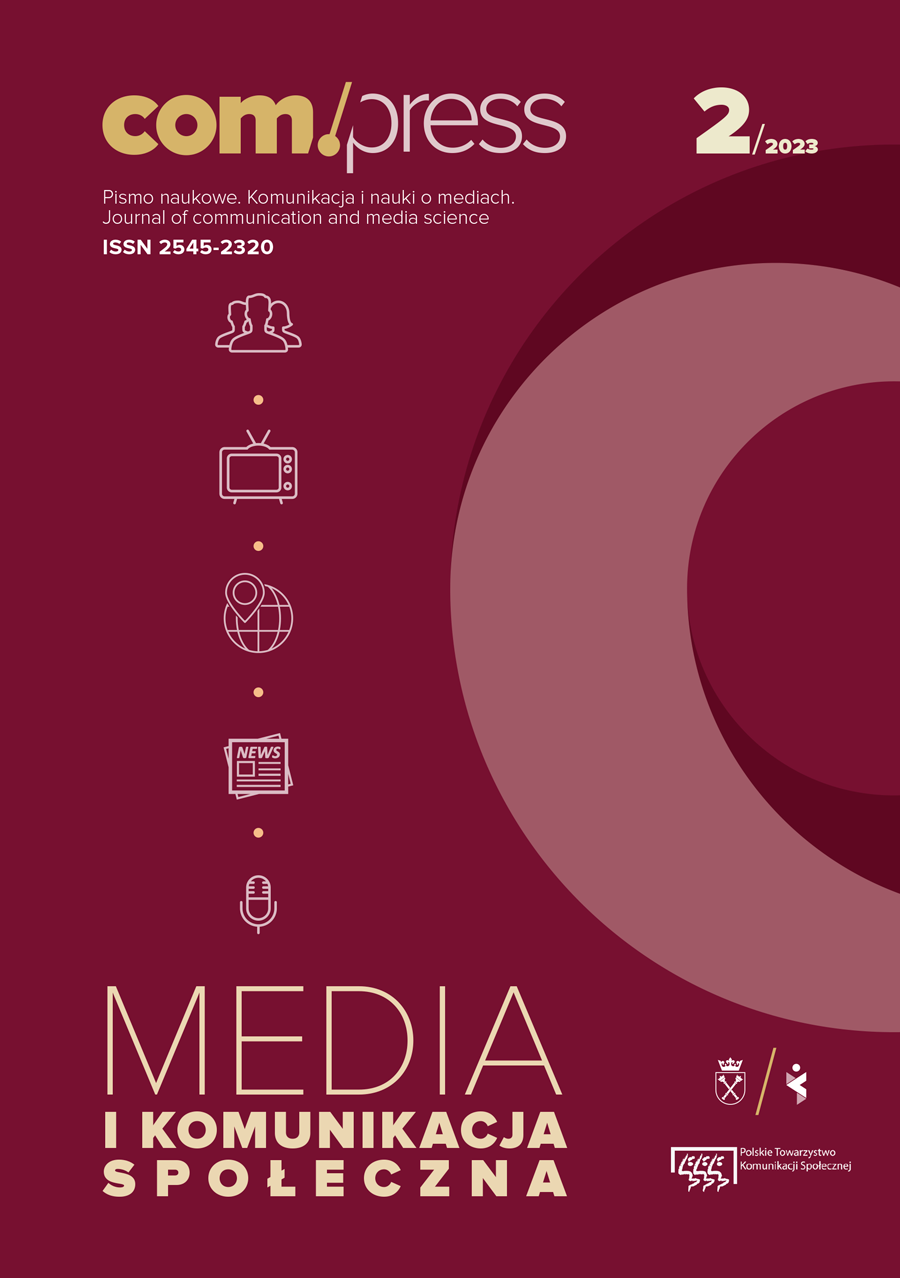Video Games Piracy in Poland over Decades
From 1980s’ to 2020’s
DOI:
https://doi.org/10.51480/compress.2023.6-2.616Keywords:
video games, piracy, Poland, new media, internetAbstract
The article presents the history and present of video game piracy in Poland. This practice is almost as old as the games themselves. In Poland in the 1980s, it was very common, e.g. due to the lack of official distribution of western games. In the following decades, computer piracy was penalized, but the scale of the phenomenon did not decrease. However, its character has evolved – bazaar trading has been replaced by the Internet and file transfer via various means (peer-to-peer, hosting and others). Despite the fact that game developers and publishers have been trying to prevent illegal copying of their products for years, pirates are constantly trying to break security methods. The study was created mainly with the use of an Internet and archival query allowing to reach old information about the phenomenon.
References
Adamczewski, K. (2022). PS2 a piraci – przegrana na własne życzenie? PSX Extreme, 2, 94–97.
Adams, J.J. (2008). Nagrywalnie Szczecina. Zakazana Planeta. Pobrano z: https://zakazanaplaneta.pl/2008/04/10/1846 (12.07.2023).
Amritha, P.P., Karthik, J., Sethumadhavan, M. (2020). Video Game DRM: Analysis and Paradigm Solution. 2020 11th International Conference on Computing, Communication and Networking Technologies. doi:10.1109/icccnt49239.2020.9225560.
Batchelor, J. (2017). EU Commission: „No evidence that piracy affects video games sales”. GameIndustry. Pobrano z: https://www.gamesindustry.biz/eu-commission-no-evidence-that-piracy-affects-video-games-sales (12.07.2023).
Brzezińska, K. (2022). Piracy in Poland the lowest in the EU. Lexology. Pobrano z: https://www.lexology.com/library/detail.aspx?g=465d62ce-ab2d-4d3b-8425-7903a43e552f (12.07.2023).
De Kosnik, A. (2019). Piracy Is the Future of Culture. Speculating about Media Preservation after Collapse. Third Text, 1–9. https://doi.org/10.1080/09528822.2019.1663687.
Deloitte (2017). Piractwo w Internecie – straty dla kultury i gospodarki. Analiza wpływu zjawiska piractwa internetowego na gospodarkę Polski na wybranych rynkach kultury. Pobrano z: https://www2.deloitte.com/content/dam/Deloitte/pl/Documents/Reports/pl_Deloitte_%20piractwo_raport.pdf.
Depoorter, B. (2014). What Happened to Video Game Piracy? How video games thrive in a world of piracy. Communications of the ACM, 57, 5, 33–34. https://doi.org/10.1145/2594289.
Fundacja Legalna Kultura (2022). Naruszenia praw autorskich w internecie na terenie Unii Europejskiej 2021. Legalna Kultura. Pobrano z: https://www.legalnakultura.pl/pl/czytelnia-kulturalna/badania-i-raporty/news/3777,naruszenia-praw-autorskich-w-interneciena-terenie-unii-europejskiej-2021#gsc.tab=0 (12.07.2023).
Gerli, D. (2022). Gaming piracy in Europe between the 80s and 90s – a brief history. Genesistemple. Pobrano z: https://genesistemple.com/the-european-bucaneers-gaming-piracy-in-the-eu-between-the-80s-and-90s (12.07.2023).
Grabowski, J., Wiosna, R. (1993). Cracked by CSL. Gambler, 1, 52–53.
Kuśmierek, M. (2023). Proces trwał 11 lat i skończył się jak żart. Chomikuj.pl jest winny, ale gryzoń pozostaje na wolności. Spider’s Web. Pobrano z: https://spidersweb.pl/2023/04/chomikuj-wyrok.html (12.07.2023).
Lessig, L. (2005). Wolna kultura. Warszawa: WSiP.
Loading… (2018). Gry, użytki – co dla Ciebie? – historia giełd komputerowych [wideo]. YouTube. https://www.youtube.com/watch?v=XSb‑PPQEU7k (12.07.2023).
Maliuk, Y. (2022). Social transformations and distribution of pirated media content on the example of video games. Skhid, 3 (3), 45. https://doi.og/10.21847/1728-9343.2022.3(3).266199.
Marecki, P. (2020). Nastolatki zarabiały na pirackich grach komputerowych więcej niż ich rodzice na etatach. Wyborcza.pl. Pobrano z: https://wyborcza.pl/alehistoria/7,121681,25695285,nastolatkowie-zarabiali-na-piraceniu-gier-komputerowych.html (12.07.2023).
Policja. (b.d.). Piractwo komputerowe. Pobrano z: https://podlaska.policja.gov.pl/pod/dzialania/przestepczosc-gospodar/struktura-wydzialu/zespol-iii/piractwo-komputerowe/28415,Piractwo-komputerowe.html (12.07.2023).
Redakcja Bulldogjob. (2019). Historia piractwa komputerowego. Bulldogjob. Pobrano z: https://bulldogjob.pl/readme/historia-piractwa-komputerowego (12.07.2023).
Rojek, K. (2022). 40 proc. młodych ludzi piraci. Dziwi was to? Antyweb. Pobrano z: https://antyweb.pl/piractwo-mlodziez-polska-europa (12.07.2023).
Rollauer, T. (b.d.). Krótka historia piractwa komputerowego w Polsce. Amigowiec. Pobrano z: https://www.amigowiec.pl/krotka-historia-piractwa-komputerowego-w-polsce (12.07.2023).
Ruczko, P. (2010). Historia Commodore 64 w Polsce, czyli… Wywiad z Waldemarem Czajkowskim. River’s Edge. Pobrano z: https://riversedge.pl/historia-commodore-64-w-polsce-czyli-wywiad-z-waldemarem-czajkowskim (12.07.2023).
Sosinsky, B. (2011). Sieci komputerowe. Biblia. Gliwice: Helion.
Todd, D. (2011). Pirate Nation. How digital piracy is transforming business, socjety and culture. London: Kogan Page.
US Department of State. (2015). 2015 Investment Climate Statement – Poland. US Department of State. Pobrano z: https://web.archive.org/web/20160308150108/https://www.state.gov/e/eb/rls/othr/ics/2015/241708.htm (12.07.2023).
Ustawa z dnia 4 lutego 1994 r. o prawie autorskim i prawach pokrewnych (tekst jedn.: Dz. U. z 2022 r. poz. 2509).
Walleij, L. (1998). Copyright does not exist. Pobrano z: http://svenskefaen.no/cdne/ch5web.htm (12.07.2023).
Wasiak, P. (2010). Komputery w czasach PRL. Jak je sprowadzano z zagranicy? Focus.pl. Pobrano z https://www.focus.pl/artykul/komputeerel (12.07.2023).
Wasiak, P. (2017). Ekonomiczne i społeczne funkcje giełd komputerowych w okresie transformacji systemowej. W: M. Sikora (red.), High-tech za żelazną kurtyną. Katowice–Warszawa: Wydawnictwo IPN.
Weisner, M. (2004). Piraci.pl. PSX Extreme, 2, 60–61.
Whitehead, D. (2010). Banging the DRM. The history of anti-piracy. Eurogamer. Pobrano z: https://www.eurogamer.net/banging-the-drm-article (12.07.2023).
Downloads
Published
How to Cite
Issue
Section
License
Copyright (c) 2024 Polish Communication Association

This work is licensed under a Creative Commons Attribution-ShareAlike 4.0 International License.
Content of the articles is licensed under a Creative Commons Attribution 4.0 International license





